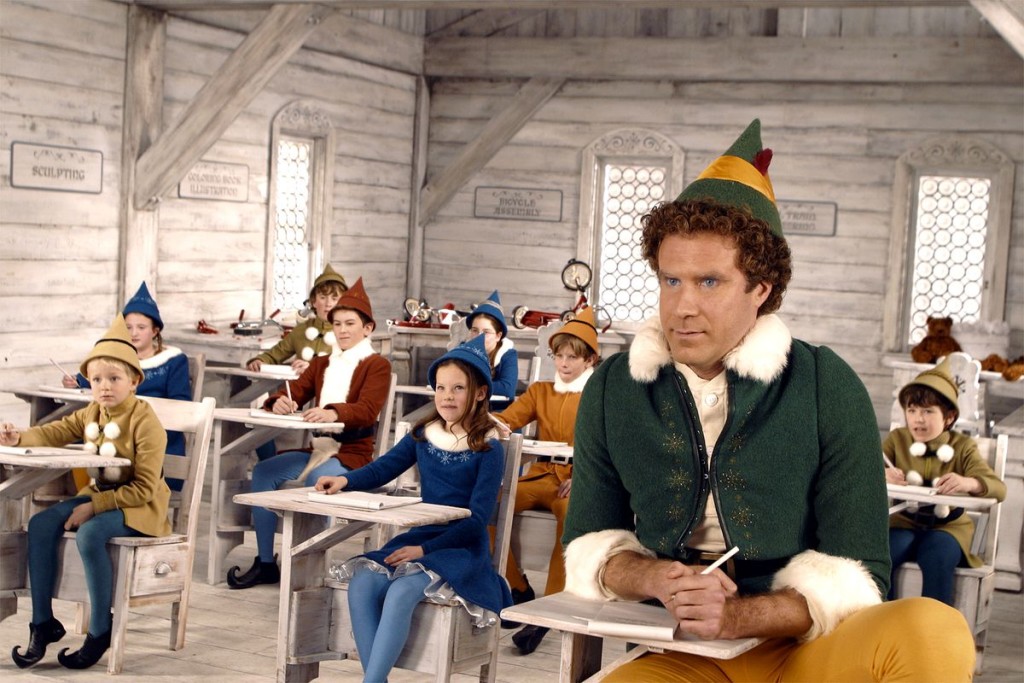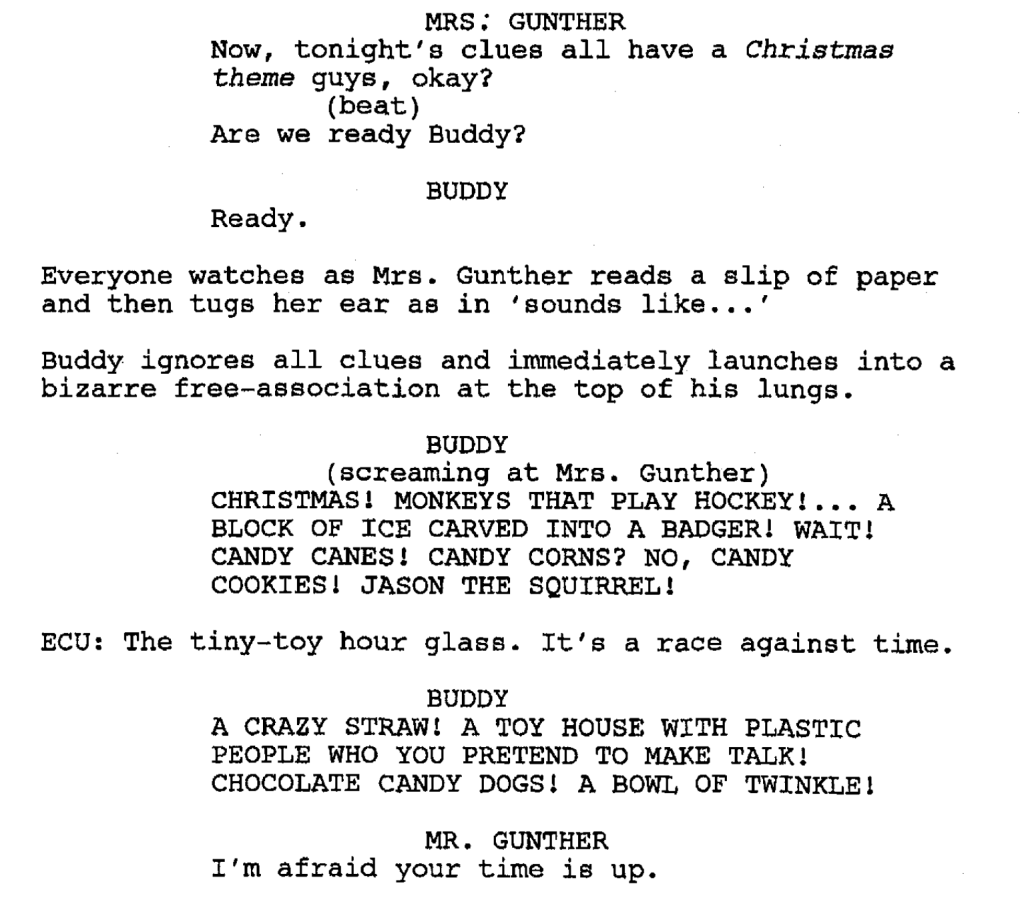Will Ferrell turned down 29 million dollars to do Elf 2. Did he make a mistake?
Genre: Comedy
Premise: Several years after becoming a viral sensation in New York City, Buddy and his wife decide to move to the suburbs to raise their daughter, where Buddy encounters an entirely new set of life obstacles.
About: Last night I read this Hollywood Reporter piece on Will Ferrell, who’s coming out with his first TV show, The Shrink Next Door. It’s a good article. Ferrell talks about why he and longtime collaborator Adam McKay split up (McKay wanted to take over the world and Ferrell didn’t feel like he had the bandwidth to join him) as well as why he turned down Elf 2. He stated that, after reading the script, he felt like he’d be making the exact same movie, and didn’t feel like he could face the public if he did that. Elf 2 was written by Scot Armstrong (Old School, The Hangover 2).
Writer: Scot Armstrong
Details: 119 pages – First Draft – July 29, 2005
Elf always seemed like a movie that everyone who participated in it endured, rather than enjoyed. No one really wanted to make it – both director Jon Favreau and Ferrell have publicly expressed their reservations about making the movie at the time. It was a ‘prove it’ role for both of them. So when it became this giant hit, everyone was surprised. And yet, even today, there seems to be this distance both parties have created between themselves and the movie. Which is bizarre because Elf is a really good movie.
This might partially explain why, even though Ferrell was offered 29 million dollars to reprise his role, the movie never happened. The main creatives behind the show simply didn’t like the movie. You know when straight-shooter James Caan (who plays Buddy’s father in the movie) is the biggest cheerleader for your film, you’re in trouble. The vibe I’m getting is that the studio had one shot to get Ferrell on board – a great script. So they hired Scot Armstrong, who’d written Ferrell’s breakout movie role (Frank the Tank in Old School), and this was the result.
Elf 2 takes place an indeterminate number years after the first one. Buddy and Jovie are now married and they have a 10 year old daughter, Susie. Buddy has become a successful children’s book author, specializing in Christmas stories, of course. Even though everyone thinks his stories are imaginative and creative, all Buddy’s doing is telling real stories from his childhood.
Despite how much Buddy loves New York, the reality is that Susie’s getting older and it’s not the best place to raise children. So they move to the suburbs. Soon, Susie is going to school, making new friends, and that’s when she meets cool girls Jess and Jamie. The three become instant besties, which is the first time Susie’s told by someone that her dad is weird. It’s a shock for Susie but the more she thinks about it, the more sense it makes. I mean, her dad *does* walk around in an elf outfit everywhere.
One day, Susie comes home and yells at her father for not being “normal.” Buddy is so mortified and desperate for his daughter’s love that he researches what “normal” is and changes his entire life to fit into this new category. Gone are the 7000 daily calories of sugar, gone is the elf outfit, gone is the name “Buddy.” Instead, Buddy now wants to be called the most normal name in the world, “Brian.” This doesn’t have the intended effect as Buddy’s attempts at acting normal only make him weirder.
One night, Jess’s father, Mr. Spicer, invites Buddy, Jovie, and Susie, over for a dinner party, which is the perfect chance for Buddy to prove that he’s normal. But, during dinner, the a-hole Mr. Spicer secretly dresses up as a leprechaun, and pops back into dinner pretending to be Buddy, acting as weird and awkward as possible. Susie now knows the truth – that her dad will always be the butt of the joke, and no longer wants him as a father.
As if that isn’t heavy enough, Buddy learns that Papa Elf has just been kidnapped by the South Pole (this happens on page 80 by the way). Snowy the Snowman dematerializes and flies to New York to recruit Buddy to save Christmas. But Buddy’s not Buddy anymore. He’s Brian. So he refuses. With every aspect of Buddy’s life falling apart, he’s unhappy for the first time. Will he become an elf again and save the day? Or will he stay true to being the normal guy his daughter demands that he be?
My initial reaction after reading Elf 2 was, “Will Ferrell, you’re being way too hard on this script!” Ferrell saying he’d be retreading everything from the first movie… I guess I *kind of* see where he’s coming from. But not really. In fact, I’d say this script tries so hard to be different from Elf that it actually hurts the story.
Elf 2 is a character piece. It’s about a complex father-daughter relationship and that always difficult transition that occurs when your kids become self-aware and start to care about what other people think of them. It’s about those first steps children take away from their parents in an attempt to become individuals. It’s raw, it’s sad, it’s complicated. This story is pretty hardcore!
I didn’t see any character depth even remotely approaching this in the first film. So what is Ferrell talking about? Ferrell plays almost a completely different character. He becomes “Normal” Buddy, which creates an interesting conflict within himself, because his instincts are to be one way yet he’s trying to become this other person. It’s actually quite deep.
Ironically, that’s what holds the script back from being great. Typically, in these big budget movies, the character stuff is the B-story. The A-story is the overall plot that’s driving the character forward. For example, in the original “Elf,” it’s Buddy trying to find and connect with his real father. 80% of the movie is the shenanigans built around him trying to achieve this goal.
You don’t have a have a big A-story like that in Elf 2 because it’s so focused on character stuff. And, for that reason, the plot sort of putters along. This is important to understand so let me reiterate it. You want a big strong story engine to thrust your character into his journey because, inevitably, your story is going to slow down at some point. It always does in the second act. So if you never had any thrust to begin with, then your story doesn’t just get slow in the second act. It becomes glacial. That’s what happens in Elf 2.
With that said, Elf 2 is still a pretty good script. Buddy is such a funny character that it’s hard not to stumble into a big laugh every once in a while. For example, there’s a scene where Buddy plays charades at the dinner party and he’s just so over-the-top you can’t help but laugh.
And Scot’s a good comedy writer. If you write comedies, you should definitely read this. He’s got the professional side of the craft down. And he also knows how to convey laughs on the page, which 98% of the comedy writers I read do not know how to do. Usually I get a comedy writer who’s either really good at formula but unfunny. Or someone who’s really funny but has no idea how to write a screenplay. Scot’s someone who can do both.
The more I read into this Ferrell interview and the more I learn about the production of Elf, it seems to me that nobody really liked making that movie and they were all dumbstruck when it became a hit. I think Ferrell had already made up his mind that he didn’t want to do an Elf sequel even before he read the script. But the studio had to do its due diligence and write a script to try and get him to say yes. They did. But he was going to say no no matter what and just came up with this excuse that it was the same movie.
Script Link: Elf 2
[ ] What the hell did I just read?
[ ] wasn’t for me
[x] worth the read
[ ] impressive
[ ] genius
What I learned: In big movies, the character stuff can’t be the A-plot. It has to be the B-plot. This is because big movies need giant stakes. Here, the character stuff (Buddy trying to win his daughter back) is the A-plot, and it’s just not big enough for a gigantic comedy film. It ends up making the movie feel small.
What I learned 2: But Carson, what about personal stakes? Those are high in this movie. Yes, the personal stakes (Buddy trying to win his daughter back) are high. But in big movies, it’s not enough. You need both the overall stakes AND the personal stakes. In smaller, indie movies (movies like Moonlight), it is acceptable to only have personal stakes.



